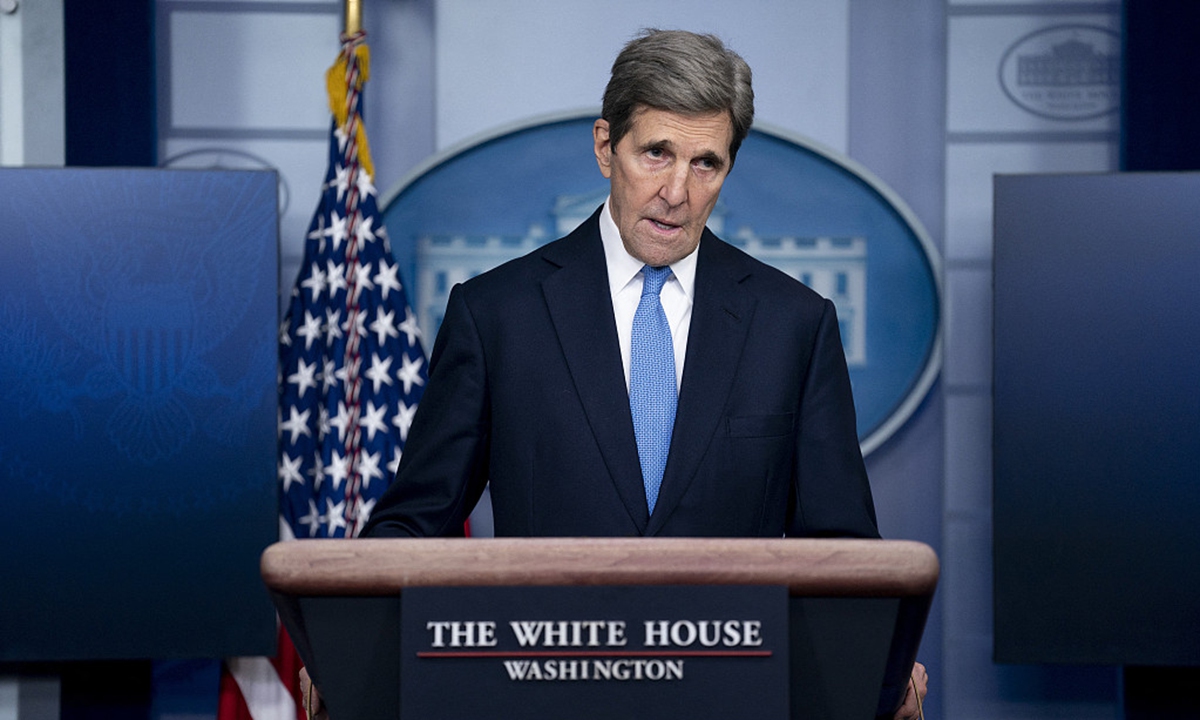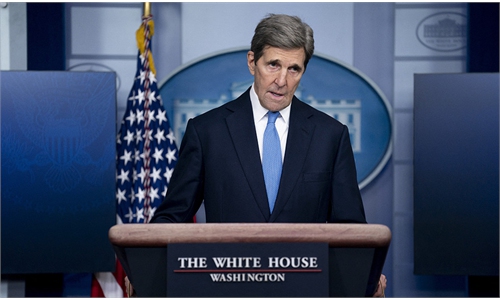US urged to take actions in climate collaboration as envoy John Kerry to visit China

John Kerry Photo:VCG
As agreed between China and the US, the US Special Presidential Envoy for Climate John Kerry will visit China from July 16 to 19, China announced on Wednesday. Despite the two countries' cooperation on addressing the climate issue being more urgent than ever as many parts of the world are sizzling under scorching temperature, experts are pessimistic about whether Kerry's visit will yield substantial results.
Washington's lack of sincerity in improving bilateral relations has hobbled the two countries' cooperation in many fields, including climate change, where the two have a good foundation. Moreover, China-US cooperation on climate issues is riddled with obstacles created by the US, including its condescending approach on China; and its reckless punishing measures on China's green industry. Chinese observers said the US' flip-flop attitude on global warming and its toxic domestic politics are also what concerns China on deepening cooperation.
Kerry's visit was announced by China's Ministry of Ecology and Environment on Wednesday. The two sides will have an in-depth exchange of views on working together to address climate change, the ministry said.
"During meetings with [People's Republic of China] officials, Secretary Kerry aims to engage with the PRC on addressing the climate crisis, including with respect to increasing implementation and ambition and promoting a successful COP28," the US State Department said in a statement.
Now it is more urgent than ever for the world's two biggest economies and emitters to join hands on addressing global warming, as our world is suffering from more climate disasters, Ma Jun, director of the Beijing-based Institute of Public and Environmental Affairs, told the Global Times.
The World Meteorological Organization said on Monday the beginning of July was the hottest week on record for the planet as a whole. It is the latest in a series of records halfway through a year that has seen a drought in Spain and fierce heatwaves in China as well as the US.
There is huge potential for the two to work together, including research and development of technology; China and US' cooperation will also inject strong impetus for global effort in this area, said Ma, noting that the two countries' previous friendly interactions have pushed meaningful results from UN Climate Change conferences.
However, experts are pessimistic that Kerry's visit will yield significant results. "For the US, cooperating with China on climate change equals making requests at its will: telling China dos and don'ts and steer clear of cooperation on technology and products," Lü Xiang, research fellow at the Chinese Academy of Social Sciences, told the Global Times.
Without discussing the technique areas, talking about how to address the global warming is no differenct than empty talk, said Lü, noting that China will talk with Kerry on the specifics, not empty goals. "We all want to meet the goals, but it is the technicalities that matter, and they must be mutually beneficial."
In 2021, the US targeted Chinese photovoltaic industry over the so-called forced labor issue in China's Xinjiang region by imposing sanctions on Chinese entities.
Washington has also been seeking to crack down on China's solar panel industry in recent years. The US Senate voted in May this year to reinstate tariffs on solar panels from Chinese companies in Southeast Asia that had been found to be coming into the US which it claimed were "in violation of trade rules."
The US officials were pressuring China on various occasions to reduce emission and step up helping finance green initiatives around the world, despite China's unremitting efforts in those fields.
Lü said China is also concerned about US' flip-flop attitude on climate change. For instance, the US withdrew from the historic 2015 Paris climate agreement under the Trump administration. In recent years, some Republican politicians have also been bashing climate change as "fake science" and they've even claimed that "carbon is healthy."
Kerry will be grilled by House Republicans on Thursday over his climate budget. "Over the last several years, we have witnessed a boondoggle of climate change spending, and our bill provides a much-needed course correction in several key areas," Subcommittee Chairman Mario Diaz-Balart, R-Fla, said last week, Boston Herald reported.
The US roller-coaster style politics is toxic for countries to cooperate with; and China should be prepared for the impact of US politics on collaboration in climate issues, Lü said.
Observers said if China and the US fail to establish an overall healthy relationship and if the US shows no sincerity in improving ties, then asking China to cooperate on addressing climate issues is like talking the impossible.
China announced a series of countermeasures, including suspending cooperation on climate change with Washington, in response to former US House Speaker Nancy Pelosi's highly provocative visit to the island of Taiwan in 2022.
The two countries have agreed to resume climate talks as Chinese President Xi Jinping and his US counterpart Joe Biden met in November 2022 ahead of the Group of 20 summit in Indonesia's resort island of Bali. The two presidents agreed that the two countries will jointly work for the success of COP27.
No empty talks, actions needed
Kerry's trip will mark the third time in a month that a high-level US official has traveled to China for talks, following US Treasury Secretary Janet Yellen and Secretary of State Antony Blinken. Both Yellen and Blinken had "productive" and "candid" talks with Chinese officials.
Experts said the Biden administration is betting on these visits to restore a fragile stability in ties with China by strengthening cooperation in areas which could serve as strategic guardrails. But the US took almost no significant action in fixing ties.
During Yellen's visit, the Chinese side raised major concerns with the US side, and urged the US to remove additional tariffs on Chinese goods, stop crackdowns on Chinese firms and treat two-way investments fairly, China's Ministry of Finance said on Monday.
However, Reuters on Wednesday cited Chad Bown, a trade economist with the Peterson Institute of International Economics, as saying that the US political pressure to raise China tariffs is growing. "There is no political appetite to reduce tariffs on China - Secretary Yellen will do well in this political climate if they manage to stay where they are."
"We welcome the visits of US high-level officials; we give the floor to them to talk as much as they want. But they should know that for China, we need to see actions," said Lü.



